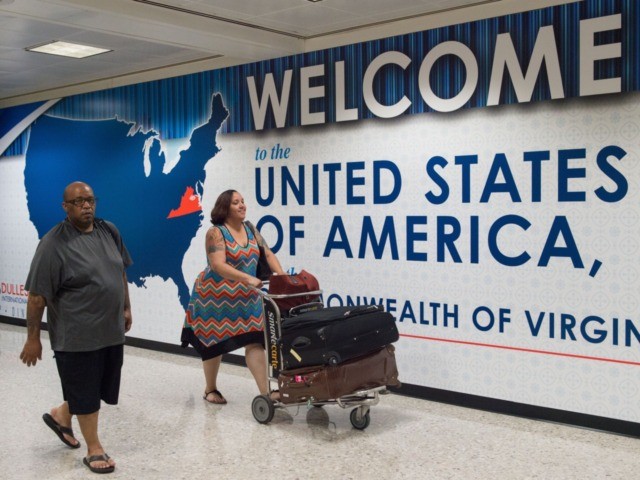Over 3.4 million people — including 759,493 traveling from China — poured into the United States as the coronavirus began to gain a grip on the world, according to an ABC News investigation.
Millions of travelers entered the U.S. during the early months of the coronavirus outbreak — December, January, and February — before the general public realized the threat the virus posed to the world and their local communities.
An ABC News investigation, analyzing the travel data of passengers from Commerce Department records and “additional information compiled by U.S. Customs and Border Protection,” found that 759,493 people entered the U.S. from China during that critical three-month period. The number includes “228,000 Americans returning home and hundreds of thousands of Chinese nationals arriving for business, academics, tourism or to visit family,” according to ABC News.
“It is difficult to estimate the portion of travelers coming from China to the U.S. with COVID-19, but fair to speculate that a large number might have been infected at the time of travel,” infectious disease specialist Dr. Simone Wildes told ABC News.
While President Trump enacted a travel ban for those traveling from China to the U.S. in early February — a move his critics eagerly deemed “racist” — thousands still traveled two months prior as the outbreak festered in China. Thousands of Americans returned home from China after the ban, and as ABC News notes, it remains “unclear how intensive, if at all, the screening was for the Americans coming home at that point”:
“The United States banned travel to China 12 days after the world heard there was an outbreak of severe pneumonia in Wuhan. … The problem was, it was too late,” said Dr. Todd Ellerin, chief of Infectious Disease at South Shore Health and an ABC News Consultant. “Even though there had only been 12 confirmed cases in the U.S. on the day President Trump announces the travel ban, the reality was there were many more unconfirmed cases.”
China served as the initial epicenter of the outbreak, but hotspots quickly popped up abroad, wreaking havoc on countries like Italy, Spain, and Great Britain. Hundreds of thousands of travelers continued to pour into the U.S. from those areas during the early months of the crisis.
According to ABC News, “343,402 arrived from Italy, 418,848 from Spain and about 1.9 million more came from Britain” during those three months, for a grand total of over 3.4 million, including China.
The State Department issued a Level 4 Do Not Travel Advisory on March 19, advising Americans to “avoid all international travel due to the global impact of COVID-19.”
President Trump has restricted travel from global hotspots, including China, Iran, Europe, and closed the southern and northern border to nonessential travel. He is also considering restricting air travel domestically as part of an effort to curb the spread of the virus within the country.
“We are thinking about hot spots where you go from spot to spot — both hot. We will let you know fairly soon,” he said on Wednesday, calling it a “very, very rough decision.”
While Trump’s orders to stop international travel from key areas certainly helped lessen the spread, experts say much of the damage was already done, given the reality and ease of international travel in the modern era:
“This is an astonishing number in a short period of time, illustrating how globalized our world has become. Just as people can hop continents with amazing ease, the infections they carry can too,” said Dr. Vinayak Kumar, an internal medicine resident at the Mayo Clinic and a contributor to the ABC News Medical Unit.
…
“I think this was bound to eventually happen,” Kumar said. “The high volume of international travel, the lack of screening, the inconsistent hand-washing and cough control … these laid down the perfect conditions for a disease to spread. Add that to a virus that is both largely asymptomatic and has a prolonged infectious period, and you have got a perfect storm of factors for a pandemic.”
Many medical experts say those carrying the virus likely traveled the U.S. not realizing what they had contracted, as some only exhibit mild symptoms that could easily be attributed to other illnesses, like the common cold. Even key governors, like New York Gov. Andrew Cuomo (D) and Florida Gov. Ron DeSantis (R) have acknowledged that the virus likely spread prior to the vast public knowledge of the threat.
“I have no doubt that the virus was here much earlier than any of us know, and we have the virus more than any other state because travelers from other parts of the world come here first,” Cuomo said.
“The fact of the matter is, as we got into February, this thing was circulating. I think it was circulating during the Super Bowl. As you’ve been able to get more testing in Miami, you’ve been able to identify cases,” DeSantis said this week.
“This is not new,” ABC News consultant John Brownstein, who serves as an epidemiologist at Boston Children’s Hospital, told the outlet. “We’ve seen this with H1N1, SARS, Zika. We should have had the infrastructure to prepare for this. And we didn’t.”
“There was a lack of recognition that a coronavirus emerging in a market in Wuhan could be at our door in a matter of months,” Brownstein continued.
“Now that it’s hitting the U.S., for the first time really, people are aware of the interconnection and risk,” he added.

COMMENTS
Please let us know if you're having issues with commenting.